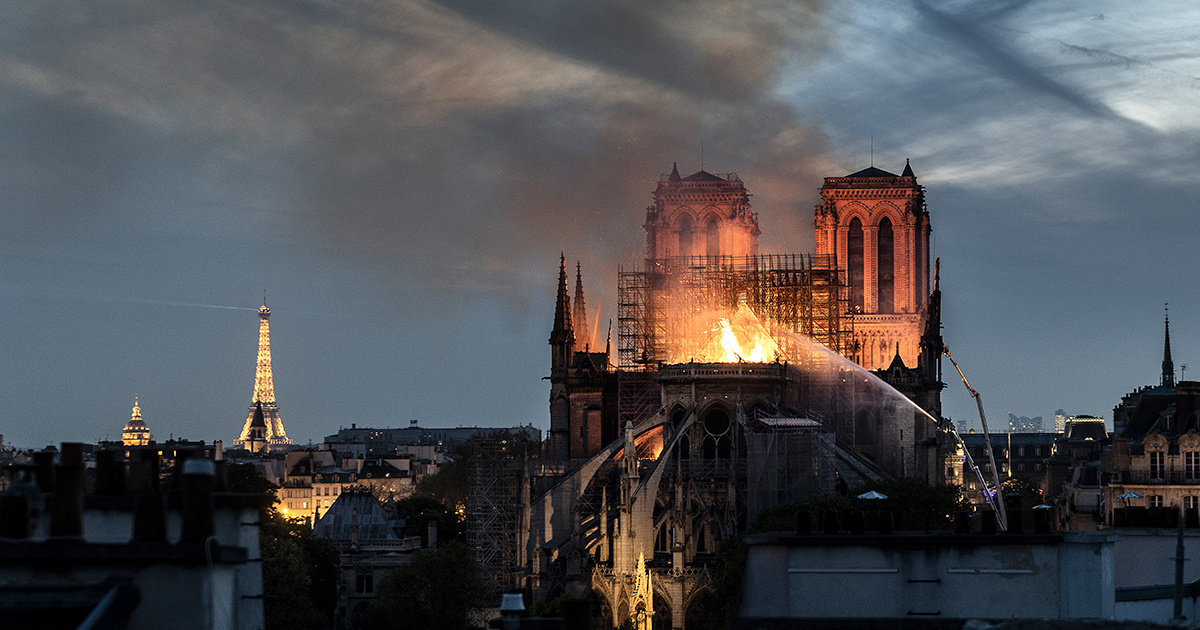

Flames and smoke are seen billowing from the roof at Notre-Dame Cathedral on April 15 in Paris, France. Veronique de Viguerie / Getty Images
When Paris’s Notre Dame caught fire on April 15, the flames threatened more than eight centuries of culture and history. The fire evoked shock, horror and grief worldwide. While the cathedral burned, French President Emmanuel Macron expressed determination to rebuild what the French regard as a sacred site.
Beset by divisive “yellow vest” demonstrations, the French were united by the Notre Dame fire in grief and their resolve to rebuild. Within a day, wealthy donors and companies pledged a billion dollars for restoration. The first challenge will be to determine what caused the fire so a repeat can be avoided in the rebuilding.
I wouldn’t wish to diminish in any way the profound emotional impact of the Notre Dame conflagration. I have visited the great cathedral a number of times, and each time has been a deep spiritual experience. But if we had a similar response of shock and horror at the death throes of the Great Barrier Reef, the toxic state of the Ganges River, the degradation of the Amazon rainforest or the rising levels of carbon in the atmosphere that gives us air, weather, climate and seasons, think of the responses we could develop.
What prevents us from action is the perceptual framework through which we encounter the world. We all share a common sensory system to inform us about what is happening around us. Humans have increased the range of our senses with telescopes, microscopes and technology to see, hear and smell far beyond the range of our organs.
However, factors like gender, ethnicity, religion, socioeconomic position and personal experience shape the way we respond to the input from our senses. Ask a man and a woman about love, sex or family, a Bay Street financier and a Bay Street homeless person about money, the economy or welfare, a Palestinian and an Israeli about Gaza, water or Jerusalem, and chances are the responses will be radically different.
One of humankind’s most important attributes for survival has been foresight — the ability to use observation, experience and imagination to look ahead and make decisions that minimize danger and take advantage of opportunity. Today, scientists and supercomputers provide powerful amplification of foresight by marshaling a vast array of information and projecting scenarios into the future. For decades, leading scientists and their organizations have warned about catastrophic changes in the chemistry of the atmosphere, depletion of oceans, spread of toxic pollutants throughout air, water and soil, acceleration of species extinction and so on.
As Ontario, Alberta, Manitoba and Saskatchewan governments vow to fight a carbon tax and pit jobs and the economy against action to reduce greenhouse gas emissions, we fail to unite in recognizing the threat of climate change to our health and survival.
Children are not yet blinded by the perceptual complications of adulthood or our verbal declarations. They see that our current trajectory is toward a radically uncertain future. Inspired in part by Swedish teenager Greta Thunberg, young people are calling on adults for real action to preserve their future. Surely that merits as profound and intense a response as the French have had to the Notre Dame fire.
We know the cause of the current ecological crisis. With our profligate use of fossil fuels and over-exploitation of renewable and non-renewable resources while putting our “wastes” into air, water and soil, we’re destroying the natural systems on which we depend for health and survival. Having identified the cause, we could commit massive amounts to stop the practices that are creating the problems while searching for new ways to provide for our needs and to exploit what we call “waste.”
This will call for a shift in the way we see ourselves in the world. By raising their future for consideration, children are trying to get politicians to move beyond their current priorities of re-election and party solidarity and to show businesspeople the folly inherent in the drive for ever-increasing profits and endless growth. There is no hidden agenda or ulterior motives behind their pleas. Ignoring their calls for action puts us on a road to extinction.
Repairing Notre Dame and preventing future damage is worthy, but we must also do the same with our precious natural systems and areas.

 233k
233k  41k
41k  Subscribe
Subscribe 